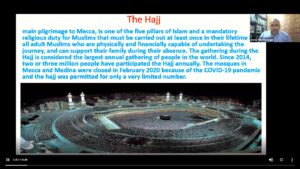Within the activities of the 73rd annual conference of the World Association for Public Opinion Research (WAPOR), and WAPOR LATAM 9th Congress, the Center’s supervisor, Dr.Samir Abu Rumman Participated in the conference, which was held online between October 6-10, after it was supposed to take place in the Kingdom of Spain.

Dr. Abu Rumman paper titled ” How people are happy with religious trip? – Hajj indicator, satisfaction of Jordanian pilgrims” Which presented the Hajj Index that was implemented by the World of Opinion Center for polls after the Hajj season.
Hajj is an annual Islamic pilgrimage to Mecca, Saudi Arabia, the holiest city for Muslims, and a mandatory religious duty for Muslims that must be carried out at least once in their lifetime, in this trip the pilgrims who preform Hajj goes in different stages, meet different people, and deal with many organizations, companies, government agencies, etc. Abu rumman tried to put a general Index with 32 items where he chose some items in each stage and test how satisfied pilgrims were through a sample from Jordan total of 315 after they performed Hajj. The index is divided into six main categories: primary information of respondents (gender, age, place of residence), satisfaction with transportation, accommodation and, Hajj performance, health care provided by Saudi and Jordanian authorities and general satisfaction with the competent authorities. The paper gave an overview results to express how people are happy/un happy with this religious trip in different stages and what can be done in the future to help have a better and more satisfaction. There are a lot of literature about Hajj, but less using quantitative methods and very less in the topic Abu Rumman covered as tried to invent this index as a primary data collected outside KSA and chose items carefully

the paper dealt with the definition of Hajj as a religious duty, Jordan and the Hajj season, the objectives sought from the implementation of the index, the scientific methodology, and the ten axes that the index dealt with Demographics information on respondents (gender, age, place of residence), satisfaction with travel procedures, transportation, housing and accommodation, the role of Saudi and Jordanian authorities, health care provided by Saudi and Jordanian authorities, and the performance of Hajj. And religious guidance, and services accompanying the performance of the rituals of Hajj, and the impact of Hajj on religious commitment. The paper also presented the services and activities that had the highest and lowest levels of satisfaction among Jordanian pilgrims whose opinions were surveyed in the index, as well as a set of recommendations that would contribute to improving and developing services provided to pilgrims.


